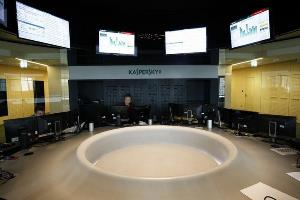UK cyber agency targets Kaspersky in warning on Russian software
 Britain’s main cyber security agency on Friday warned British government agencies to avoid using anti-virus software from Russian companies, the latest in a series of moves targeting Moscow-based security software maker Kaspersky Lab.
Britain’s main cyber security agency on Friday warned British government agencies to avoid using anti-virus software from Russian companies, the latest in a series of moves targeting Moscow-based security software maker Kaspersky Lab.
In a letter to departmental permanent secretaries, the director of the UK National Cyber Security Centre, Ciaran Martin, said Russian-made anti-virus software should not be used in systems containing information that would harm national security if it was accessed by the Russian government. He said his agency is in talks with Kaspersky Lab to develop a system for reviewing its products for use in Britain.
Read moreTrump administration orders purge of Kaspersky products from US government
 The Trump administration on Wednesday told U.S. government agencies to remove Kaspersky Lab products from their networks, saying it was concerned the Moscow-based cyber security firm was vulnerable to Kremlin influence and that using its anti-virus software could jeopardize national security.
The Trump administration on Wednesday told U.S. government agencies to remove Kaspersky Lab products from their networks, saying it was concerned the Moscow-based cyber security firm was vulnerable to Kremlin influence and that using its anti-virus software could jeopardize national security.
The decision represents a sharp response to what U.S. intelligence agencies have described as a national security threat posed by Russia in cyberspace, following an election year marred by allegations that Moscow weaponized the internet in an attempt to influence its outcome.
Read moreWhy the US government shouldn't ban Kaspersky security software
 Earlier this summer the House Science Committee sent letters to 22 US government agencies requesting information on their use of Kaspersky Lab security products.
Earlier this summer the House Science Committee sent letters to 22 US government agencies requesting information on their use of Kaspersky Lab security products.
As the federal government continues to investigate claims of ties between the Trump administration and Russia, officials in Washington have expressed concern that the government's use of software from Kaspersky Lab—a well-known security vendor based in Russia—could compromise domestic intelligence. This request represents the most recent action in an aggressive campaign by Congress.
Read moreU.S. senators seek military ban on Kaspersky Lab products amid FBI probe
 U.S. senators sought on Wednesday to ban Moscow-based cyber security firm Kaspersky Lab's products from use by the military because of fears the company is vulnerable to "Russian government influence," a day after the FBI interviewed several of its U.S. employees as part of a probe into its operations.
U.S. senators sought on Wednesday to ban Moscow-based cyber security firm Kaspersky Lab's products from use by the military because of fears the company is vulnerable to "Russian government influence," a day after the FBI interviewed several of its U.S. employees as part of a probe into its operations.
Federal Bureau of Investigation agents visited the homes of Kaspersky employees late on Tuesday in multiple U.S. cities, although no search warrants were served, according to two sources, who spoke on condition of anonymity because they were not authorized to discuss the FBI probe.
Read moreKaspersky files antitrust complaints against Microsoft in Europe
 Russian security software maker Kaspersky Lab has filed antitrust complaints against Microsoft with the European Commission and the German federal cartel office, it said in a statement on Tuesday.
Russian security software maker Kaspersky Lab has filed antitrust complaints against Microsoft with the European Commission and the German federal cartel office, it said in a statement on Tuesday.
Kaspersky Lab said Microsoft was abusing its dominance in the PC operating system market, creating obstacles for independent software security vendors by distributing its own Defender anti-virus software with the ubiquitous Windows operating system. Microsoft built the anti virus software into Windows, saying this protected users but Kaspersky said it was anti-competitive. Microsoft said in a statement on Tuesday that it had not violated any laws.
Read moreOfficials fear Russia could try to target US through popular software firm under FBI scrutiny
 Russia’s growing aggression toward the United States has deepened concerns among U.S. officials that Russian spies might try to exploit one of the world’s most respected cybersecurity firms to snoop on Americans or sabotage key U.S. systems.
Russia’s growing aggression toward the United States has deepened concerns among U.S. officials that Russian spies might try to exploit one of the world’s most respected cybersecurity firms to snoop on Americans or sabotage key U.S. systems.
Products from the company, Kaspersky Lab, based in Moscow, are widely used in homes, businesses and government agencies throughout the United States, including the Bureau of Prisons. Kaspersky Lab’s products are stocked on the shelves of Target and Best Buy, which also sells laptops loaded by manufacturers with the firm’s anti-virus software.
Read moreKaspersky Lab, McAfee, and AVG all vulnerable to major flaw
 A common security bug affected the antivirus engines of three major vendors, AVG, McAfee, and Kaspersky, as enSilo security researchers have discovered. The problem was first detected back in March 2015, when one of enSilo's own products collided with an AVG antivirus on one of its client's workstations.
A common security bug affected the antivirus engines of three major vendors, AVG, McAfee, and Kaspersky, as enSilo security researchers have discovered. The problem was first detected back in March 2015, when one of enSilo's own products collided with an AVG antivirus on one of its client's workstations.
After further investigation into the matter, enSilo's staff uncovered a security bug in the AVG antivirus as being the cause of the software incompatibility. The security bug relates to the fact that the AVG antivirus creates a memory space with full RWX privileges where it normally runs. Attackers would be allowed to bypass Windows built-in security features.
Read more New secured zone of Google Play: secure messenger SafeUM for Android. Download, Install, Communicate
New secured zone of Google Play: secure messenger SafeUM for Android. Download, Install, Communicate
Axarhöfði 14,
110 Reykjavik, Iceland














